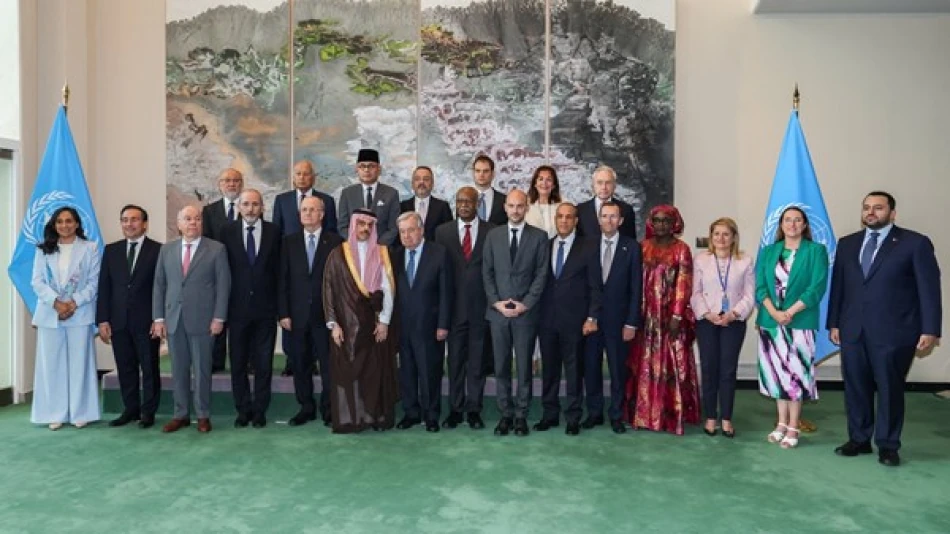
Saudi-French Led International Conference Aims to Advance Two-State Solution
UN Chief Warns Two-State Solution at "Breaking Point" as Saudi-French Summit Seeks Palestinian Peace
UN Secretary-General António Guterres delivered a stark warning that the two-state solution for Palestine has reached a "breaking point" and is "further away than ever" as a high-level international conference opened Monday at UN headquarters in New York. Co-chaired by Saudi Arabia and France, the summit represents a critical diplomatic push to revive what many consider the last viable framework for Middle East peace.
A Diplomatic Last Stand
The timing of this conference reflects growing international alarm over the deteriorating prospects for Palestinian statehood. With over 120 officials and delegates participating in the two-day summit, the gathering aims to reaffirm global support for the two-state solution while coordinating concrete steps toward its implementation.
Guterres framed the conference as potentially pivotal, urging participants to make it a "decisive turning point" rather than "another exercise in rhetoric and good intentions." His unusually blunt language signals the UN's recognition that traditional diplomatic approaches have failed to gain traction amid escalating violence and political deadlock.
The Saudi-French Partnership Strategy
The joint Saudi-French leadership of this initiative represents a significant diplomatic alignment. Saudi Arabia's involvement reflects the kingdom's broader regional influence and its recent diplomatic engagement with Palestinian issues, while France brings European Union backing and historical ties to Middle Eastern peace processes.
This partnership mirrors similar diplomatic coalitions that have emerged in recent years, such as the Abraham Accords framework, but takes a fundamentally different approach by prioritizing Palestinian statehood over bilateral normalization deals that bypass the Palestinian question.
Legal Framework Under Pressure
Guterres emphasized that the two-state solution remains "the only framework based on international law," envisioning two states coexisting along pre-1967 borders with Jerusalem as a shared capital. However, his acknowledgment of "creeping annexation" in the West Bank highlights how facts on the ground continue to erode this legal foundation.
The Secretary-General's condemnation of unilateral actions and what he termed "systematic dismantling of peace building blocks" reflects growing international frustration with settlement expansion and administrative measures that many view as de facto annexation.
Humanitarian Crisis as Political Catalyst
The conference takes place against a backdrop of what Guterres described as "population starvation" and "comprehensive destruction" in Gaza. These humanitarian conditions have intensified international pressure for a political solution, as purely humanitarian responses prove inadequate to address the scale of the crisis.
The summit's three discussion sessions will address humanitarian aid and reconstruction, indicating recognition that any political framework must be accompanied by massive international investment in Palestinian infrastructure and governance capacity.
Market and Geopolitical Implications
For regional economies and international investors, the conference represents both opportunity and uncertainty. A successful diplomatic breakthrough could unlock significant reconstruction funding and economic development projects, particularly in Gaza and the West Bank. However, continued political deadlock threatens to perpetuate regional instability that has historically deterred long-term investment.
The Saudi-French co-chairmanship also signals potential shifts in regional alliances, with implications for energy markets and trade relationships across the Middle East and Europe.
Beyond Diplomatic Theater
The success of this conference will likely be measured not by declarations but by concrete commitments from major powers to pressure all parties toward meaningful negotiations. Guterres's emphasis on "political will and courageous leadership" suggests that technical solutions exist, but implementation requires leaders willing to take significant political risks.
The two-day format and high-level participation indicate serious diplomatic intent, but the ultimate test will be whether participating nations commit resources and political capital to enforce any agreements reached. Without such commitment, this gathering risks joining a long list of well-intentioned but ultimately ineffective peace initiatives.
Most Viewed News

 Layla Al Mansoori
Layla Al Mansoori






